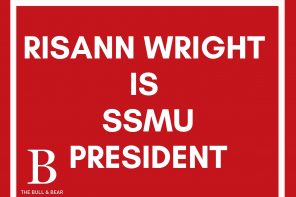Two candidates who unsuccessfully ran for SSMU executive positions this year have filed separate Judicial Board cases in response to an allegedly biased treatment during the campaign period by the Elections SSMU Chief Electoral Officer, Rachelle Bastarache. Alexei Simakov, former candidate for President, and Johanna Nikoletos, former candidate for VP Internal, both claim that the uneven use of sanctions and improper monitoring tarnished the democratic spirit of the elections procedures and may have affected the number of votes received by each candidate during the election.
Simakov’s case accuses Elections SSMU of mishandling an instance when Kareem Ibrahim, the SSMU President-elect, and his campaign team conducted libel “through serious allegations of privacy invasion.” Specifically, Simakov was referring to Ibrahim’s assertions that he was aware of – and possibly implicated in – the now-infamous “Karaldigate” screenshots before they were posted online. Simakov claims that the CEO attributed the online accusations to Ibrahim’s “exacerbated state of mind,” although Ibrahim never submitted a formal apology or retracted the comments. According to the filing, Simakov accuses Elections SSMU of ignoring two bylaws broken by Ibrahim and his campaign team, namely “14.6 Interference with Campaigning” and “14.2 Spirit of a Fair Campaign.”
Additionally, Simakov claims that sanctions were unevenly applied by the Elections CEO in this instance and in others: “she threatened to give me sanctions for screenshots I didn’t post or didn’t approve to post,” expressed Simakov.
Simakov emphasized that the object of the case is not Ibrahim or his team, but rather the conduct of the Elections SSMU office.
Loose interpretation of bylaws
According to Simakov, the office placed improper and uneven focus on sanctioning online conduct: “in this election there were many tangible and visible violations happening around campus and within residence, and those things should be punished instead of things such as liking statuses or posting comments.”
Simakov attributes the varying applications of the bylaws to the amount of power and discretion held by Elections CEO when implementing sanctions. “Throughout the election, I was regularly threatened to be disqualified by [Rachelle, the Elections CEO]. I don’t think that this type of decision should be left to the discretion of a single person,” Simakov explained.
Another issue mentioned by Simakov was the lack of accessibility of electoral rules to the public. “During the campaign period, Rachelle set a rule: ‘if you’re unsure of anything contact me first.’ I think this is wrong because, why should we assume that something is illegal, and how will the public know what they can and cannot do?” posited Simakov.
During the campaign period, Rachelle set a rule: ‘if you’re unsure of anything contact me first.’ I think this is wrong because, why should we assume that something is illegal, and how will the public know what they can and cannot do?
Additionally, Simakov thinks more policies should be set concerning who runs for SSMU executive. “There are currently no rules specific to floor fellows. I think there should be certain regulations on floor fellows because of their exposure to students [and the fact that] campaigning also takes away their ability to address their responsibilities to the students they are hired to be responsible for.”
Nikoletos submits another case
Nikoletos’ filing comes on the heels of her appeal to the Election Review Committee (ERC) last week, which deemed that there was insufficient evidence to invalidate the VP Internal election. Nikoletos lost to the winning candidate, Lola Baraldi, by a margin of only 13 votes. Her previous filing focused specifically on bylaws broken by Baraldi while campaigning in the New Residence Hall lobby and cafe.
“When we petitioned for the ERC, we based it off of a bunch of testimonies. A lot of people started coming forward to us about events in the New Residence lobby,” explained Nikoletos. “Basically we found out about some serious campaign infractions, and asked the ERC to look into these. They deemed that we ultimately didn’t have enough evidence to invalidate the election, but they did acknowledge that the infractions did happen.”
As opposed to the ERC appeal, the case Johanna is bringing forward to the J-Board is not aiming to invalidate the elections, but rather to uphold the democratic process at McGill. “We’re petitioning because we think that the elections team didn’t do their job in upholding a fair campaign and making the candidates feel that they were treated equally,” expressed Nikoletos.
Following the rejection of Nikoletos’ case by the ERC, the committee released a public censure on Baraldi for the bylaw infractions uncovered in their investigation. Nikoletos believes that the public censure illustrates how the elections office mishandled the campaign period. “Because the sanctions were issued after the campaign was called, the censure was pointless in terms of making the elections fair,” explained Nikoletos.
Like Simakov, Nikoletos’ evidence features the office’s approach to online campaigning. “There are a lot of discrepancies that don’t add up; [notably] the office ruled that cover photos and profile pictures are not campaigning. However, these items can be perceived as written materials for the purpose of campaigning,” Nikoletos stated. “People would have a picture of one person as their profile picture, and a picture of another candidate as their cover photo, and the appearance of two candidates together creates a certain association that infringes on elections bylaws,” she continued.
Nikoletos also believes that the elections office allowed behaviour on social media that allowed some candidates to gain more exposure than others. “When you submit your nomination package, you have to state your privileged access. During the campaign, Lola posted in the Faculty of Arts Facebook group in which she is an administrator, and when an administrator posts in a group, every member of the group gets a notification, and therefore draws attention to one person’s name,” Nikoletos noted.
The elections office deemed that, because of the varying notification settings of Facebook users, it was impossible to assess how many people were reached through the posting. Nikoletos suggests that their investigation was too lenient, and that Lola’s use of the Facebook page was an abuse of her position, an infraction that Nikoletos feels should have prompted sanctions.
Ultimately, both Simakov and Nikoletos maintain that the objective of their judicial board cases is not to invalidate the results of the elections. Rather, both aim to bring to light what they consider unfair inconsistencies in the application of sanctions and the interpretation of by-laws by the Elections SSMU CEO. Considering the growing importance of online campaigning in student elections, these cases may actually serve to prompt a review of those regulations that some deem too vague and conducive to partiality.
ERRATUM: The original version of this post included a statement from Johanna Nikoletos regarding a possible unfair application of electoral rules during the debate. Upon review of the livestream, it was determined that the rules had been applied fairly to both candidates.








